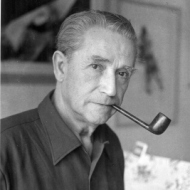Vačkář Dalibor C.
- Year of Birth - Death :
- 1906 - 1984
Biography
The name of Vackar is very popular throughout Czechoslovakia. There is hardly a community in the whole country where they would not know the name of Vaclav Vackar, a composer of popular music - waltzes, marches, serenades and songs - which formed a permanent part of the repertoire regularly broadcasted on the radio and were played by many village wind-bands and brass orchestras. His son, Dalibor C. Vackar received from him the best musical education available at that time. D. C. Vackar studied composition at the Prague Conservatory under Otakar Sin and the violin with Rudolf Reissig. He followed up his studies in the master classes of Josef Suk (composition) and of Karel Hoffman, who played the first violin of the famous Bohemian Ouartet. After two years of post-graduate study he graduated from these master classes simultaneously. He wrote a Violin Concerto and interpreted its solo part. His gifts in both these fields were very promising and it was not clear which path Vackar would follow. But there was yet a third field of activity which attracted hím: literature. At twenty-one he published poetry and prose under the name od D. C. Faltis (the family name of his mother), and, later on, a whole series of literary works some of which were awarded prizes. In 1940 the Prague avantgarde theatre, owned and managed by director E. F. Burian, presented Vackar' s dramatization of O. Wilde' s novel The Spectre of Canterville. During the German occupation of Czechoslovakia - 1939-1945 - the Prague National Theatre staged his plays Veronika, Station Gordian, and Clouds in the Sky which were so successful that the dramatist seemed to overshadow the composer. At that time Vackár definitively abandoned his career as a violin virtuoso and - in 1945 - gave up his post as violinist in the Prague Radio Symphony Orchestra in order to devote himself entirely to composition and literature. It is necessary to know all this about D. C. Vackar to understand him as a composer.
In the pre-war period D. C. Vackár belonged among the musical avantgarde grouped around the "Pritomnost" Society. However, he did not write avantgarde music merely for the sake of it. His sincere search was to express his time by new compositional means. He never wrote anything that did not spring from his inner creative urge without thoroughly considering every note, without experiencing it. In this he resembled Josef Suk, his teacher. He tried his hand at all genres of music - mainly it was concertante music in which he created works not only for the piano and the violin, but also for other instruments not represented by many important works in classical music until the time of his youth, such as the trombone, the trumpet, the clarinet, the bassoon, the harpsichord, etc. From a number of chamber music pieces he passed on to four symphonies, two ballets and vocal cycles, to instructional music for youth and to film music. These compositions reveal D. C. Vackar as a composer who pursued progressively and with perseverance his own line. Deep feeling is combined with cultivated musicianship, intellect with a broad artistic outlook, sense of form with an art of composing based on an intimate knowledge of both traditional and the most recent techniques of composition. His choice of themes often betray an intellectual and profound thinker (e. g. his Smoking Symphony symbolizing fire and smoke in the life of men from antiquity to the present day, etc.). His artistic creed can best be characterized by his own statement: "Music must mean beauty, an aesthetic experience in the true sense ot the word. If a composer does not respect this requirement he does not write music".
© 2012-2025 Musicbase.cz
Webdesign & hosting Nux Ltd.
Information about web | Sitemap | RSS | Statistics | CMS
Contact information
Music information center, o.p.s.
tel: 257 312 422 | e-mail: his@musica.cz

